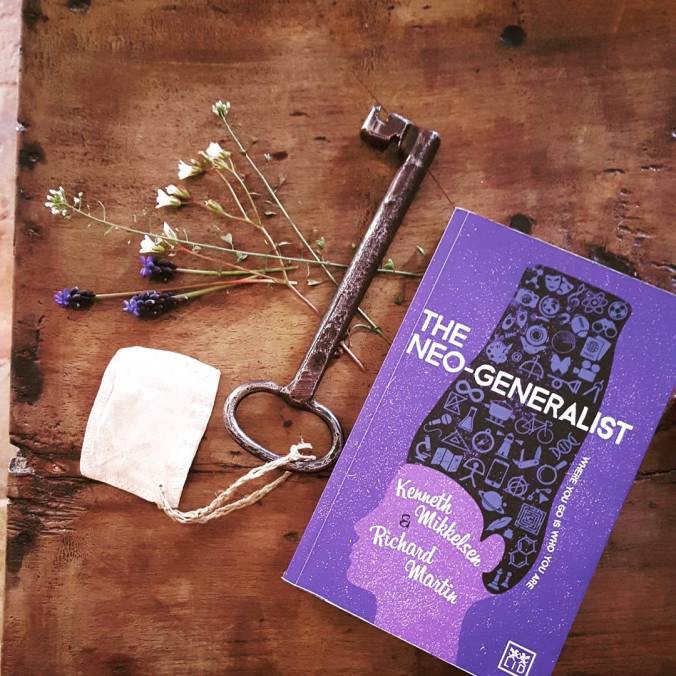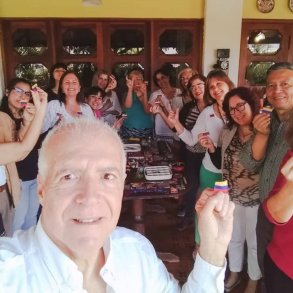By Gunther Sonnenfeld and originally published at medium.com

How Kenneth Mikkelsen and Richard Martin’s seminal book is a great reminder that mastering multiple disciplines isn’t a curse, but a requirement for many of us in today’s complex world.
I know that some of you reading this will immediately identify with it.
You were born into the world, and as your eyes opened for the first time, you saw a blank canvas with many possibilities.
Of course, you didn’t yet have the linguistic tools to describe it that way, but you did have the capability to see something with real eyes.
Soon after birth, you were indoctrinated into this thing called civilization, at which point you were ‘educated’, ‘socialized’, and from there, you developed certain belief systems which have guided the realities you create.
You and I must acknowledge the impact this has on our abilities to imagine what’s possible beyond what we think we know or what we choose to believe.
Hence, neo-generalism brings with it a certain kind of gravitas in a world that often seems rudderless.
This is a great articulation and contextualization for the rise of neo-generalists.
 I consider life to be a process of remembering.
I consider life to be a process of remembering.
Remembering what we already might know through the lens of experience. Of (un)(re)learning.
Ideas, concepts, thought forms and memories are Universal. They coalesce or manifest through our minds, bodies and spirits as individuated expressions of consciousness. Originality itself is a concept, just as stories are renditions of realities, and dreams are their own channels to interpret, and in some instances to create, reality.
Creativity — as a central element — is the experience of individuated expression that can connect and transcend the boundaries presented in the world. The version of the world that is prescribed to us through various institutions like education or science or religion.
These institutions can represent a holographic world. Often times, an inorganic world.
In this vein, we have choices we can make, as well as choices we can create.
In order to create choices, it is imperative that we develop an ability to see. Seeing (having or holding vision) requires that we develop and constantly evolve creative skill-sets, or what we like to call ‘creative literacies’ or ‘literacies of the imagination’.
The Power of Seeing
An important distinction between thinking and seeing.medium.com
 Developing discipline as a form of self-mastery.
Developing discipline as a form of self-mastery.
Returning to the notion of the neo-generalist, it becomes clear that our curiosities to learn and discover new things comprise the most important existential attribute of being human. And of course, as we become more ‘civilized’, it can also be the thing we sacrifice the most.
In our work, we’ve seen that many people become unconscious to their humanity, meaning that they tend to sacrifice discernment or experimentation for the illusory comfort of routine.
Routines have their place in everyday life, no doubt. Yet, what we must also keep in mind is that routines and discipline are not nearly the same thing — the former is based on repetition, while the latter is based on deep learning, often attained through confrontation and/or discomfort.
Deep Training (self-mastery) dispels many myths, such as youth in entrepreneurship.
We live in a world that affords us automated comfort, and we pay a price for this in terms of our own personal evolutions.

With clear minds, and training that culminates in self-mastery, we can transcend myths around the way things are supposed to be.
One of the great myths and cultural memes worth deconstructing is the notion that young people are the most fit to lead and run companies. While there are many talented young people who may in fact play these roles well, we have also found that people with substantial life experience are greatly suited to lead and operate.
In the companies that we support, the average age of founders is 38, and most of the operators are over 40, some 50+. All of them are neo-generalists, and all of them train intensively to sharpen their minds, their bodies and their spirits.
The latency phenomenon.
One interesting thing that I’ve noticed as a neo-generalist is that the experimental work I’ve done tends to come around in 5-10 year cycles.
The latency between how ideas or experiments take shape and how they manifest in commercial and/or civic spaces is a great teacher: You realize that nothing you do is really done in vain, nor that your efforts ever really ‘go to waste’.
As you engage in developing various skills, you also see how they interrelate over time, even if it is not at all clear in the moments that you initiate the efforts to develop those skills.
Literacies of the Imagination.
Having spent many years in startup + corporate and civic innovation spaces, I’ve seen how much the mind gets in the way of what the imagination can do. It might sound oxymoronic, but the truth is that intellectualizing concepts and embodying ideas into manifestation are very different things.
To be clear, this is less about what any one of us has done, and more about what we’ve learned to then create what’s possible.

That said, I now consider myself ‘successful’ because I’ve taken the necessary risks to get uncomfortable and to learn as much as I could about what I don’t know that I don’t know.
Money… material possessions… status… those are mere by-products of my learning. Don’t get me wrong, I respect those things, but they do not drive me to do what I do. They do not comprise my purpose in doing what I do.
Purpose as a form of Deliberate Intention.
There’s an awful lot of talk about ‘purpose’ amid innovation circles, and one of the things that stands out the most is most people think of purpose as a mission of a business. But it’s much bigger than that.
Purpose is a form of commitment that represents an ‘in service to’ proposition about your actual role, and/or your organization’s role, in the world. Purpose is an intention. A deliberate, committed intention that goes beyond a business or market trajectory — it is something that can rebuild society, or protect the planet, or recreate human narratives.
It is big, bold and incredibly clear. For a neo-generalist, it is a catalyst by which curiosities and new skills emerge.
Neo-Generalism is a process of becoming whole… again.
One of the great takeways for me in reading the book is that it reinforces how important it is to embrace the unknown, and to be comfortable with not knowing things.

The world as prescribed has never really made much sense to me, and I know that many people feel the same way. This realization is an incredible source of power.
It is both a right and a responsibility for each of us to become whole again, and in the process, rediscover our innate power.
What matters now is what we build, as human beings in service to other human beings, such that we can make history, and create wondrous possibilities for generations to come.
 As a neo-generalist, I am in service to creating a healthy, compassionate, regenerative economic system.
As a neo-generalist, I am in service to creating a healthy, compassionate, regenerative economic system.
Republished with permission.
Featured Image/graphic link added by Enlivening Edge Magazine.




